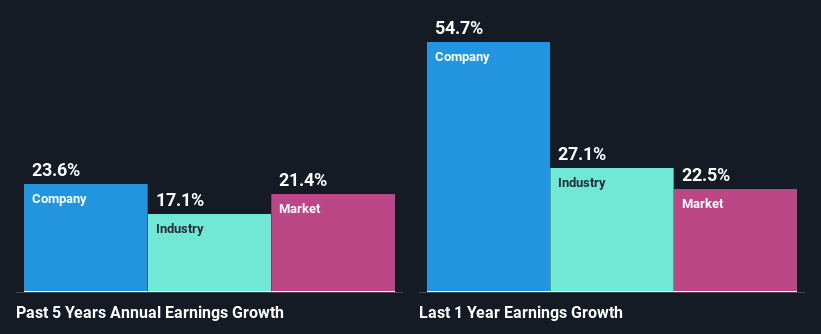Bikaji Foods International Limited's (NSE:BIKAJI) Stock Has Been Sliding But Fundamentals Look Strong: Is The Market Wrong?
Bikaji Foods International (NSE:BIKAJI) has had a rough three months with its share price down 7.3%. However, a closer look at its sound financials might cause you to think again. Given that fundamentals usually drive long-term market outcomes, the company is worth looking at. Particularly, we will be paying attention to Bikaji Foods International's ROE today.
Return on Equity or ROE is a test of how effectively a company is growing its value and managing investors’ money. In simpler terms, it measures the profitability of a company in relation to shareholder's equity.
See our latest analysis for Bikaji Foods International
How To Calculate Return On Equity?
The formula for ROE is:
Return on Equity = Net Profit (from continuing operations) ÷ Shareholders' Equity
So, based on the above formula, the ROE for Bikaji Foods International is:
17% = ₹1.8b ÷ ₹10b (Based on the trailing twelve months to December 2023).
The 'return' is the yearly profit. So, this means that for every ₹1 of its shareholder's investments, the company generates a profit of ₹0.17.
What Is The Relationship Between ROE And Earnings Growth?
Thus far, we have learned that ROE measures how efficiently a company is generating its profits. Based on how much of its profits the company chooses to reinvest or "retain", we are then able to evaluate a company's future ability to generate profits. Assuming everything else remains unchanged, the higher the ROE and profit retention, the higher the growth rate of a company compared to companies that don't necessarily bear these characteristics.
Bikaji Foods International's Earnings Growth And 17% ROE
At first glance, Bikaji Foods International seems to have a decent ROE. On comparing with the average industry ROE of 12% the company's ROE looks pretty remarkable. Probably as a result of this, Bikaji Foods International was able to see an impressive net income growth of 24% over the last five years. However, there could also be other causes behind this growth. For instance, the company has a low payout ratio or is being managed efficiently.
Next, on comparing with the industry net income growth, we found that Bikaji Foods International's growth is quite high when compared to the industry average growth of 17% in the same period, which is great to see.

Earnings growth is a huge factor in stock valuation. It’s important for an investor to know whether the market has priced in the company's expected earnings growth (or decline). This then helps them determine if the stock is placed for a bright or bleak future. One good indicator of expected earnings growth is the P/E ratio which determines the price the market is willing to pay for a stock based on its earnings prospects. So, you may want to check if Bikaji Foods International is trading on a high P/E or a low P/E, relative to its industry.
Is Bikaji Foods International Efficiently Re-investing Its Profits?
Bikaji Foods International has a really low three-year median payout ratio of 11%, meaning that it has the remaining 89% left over to reinvest into its business. So it looks like Bikaji Foods International is reinvesting profits heavily to grow its business, which shows in its earnings growth.
While Bikaji Foods International has seen growth in its earnings, it only recently started to pay a dividend. It is most likely that the company decided to impress new and existing shareholders with a dividend. Looking at the current analyst consensus data, we can see that the company's future payout ratio is expected to rise to 25% over the next three years. However, Bikaji Foods International's future ROE is expected to rise to 22% despite the expected increase in the company's payout ratio. We infer that there could be other factors that could be driving the anticipated growth in the company's ROE.
Conclusion
On the whole, we feel that Bikaji Foods International's performance has been quite good. In particular, it's great to see that the company is investing heavily into its business and along with a high rate of return, that has resulted in a sizeable growth in its earnings. We also studied the latest analyst forecasts and found that the company's earnings growth is expected be similar to its current growth rate. Are these analysts expectations based on the broad expectations for the industry, or on the company's fundamentals? Click here to be taken to our analyst's forecasts page for the company.
Valuation is complex, but we're here to simplify it.
Discover if Bikaji Foods International might be undervalued or overvalued with our detailed analysis, featuring fair value estimates, potential risks, dividends, insider trades, and its financial condition.
Access Free AnalysisHave feedback on this article? Concerned about the content? Get in touch with us directly. Alternatively, email editorial-team (at) simplywallst.com.
This article by Simply Wall St is general in nature. We provide commentary based on historical data and analyst forecasts only using an unbiased methodology and our articles are not intended to be financial advice. It does not constitute a recommendation to buy or sell any stock, and does not take account of your objectives, or your financial situation. We aim to bring you long-term focused analysis driven by fundamental data. Note that our analysis may not factor in the latest price-sensitive company announcements or qualitative material. Simply Wall St has no position in any stocks mentioned.
About NSEI:BIKAJI
Bikaji Foods International
Manufactures, purchases, and sells snack food products in India and internationally.
High growth potential with excellent balance sheet.
Similar Companies
Market Insights
Community Narratives



